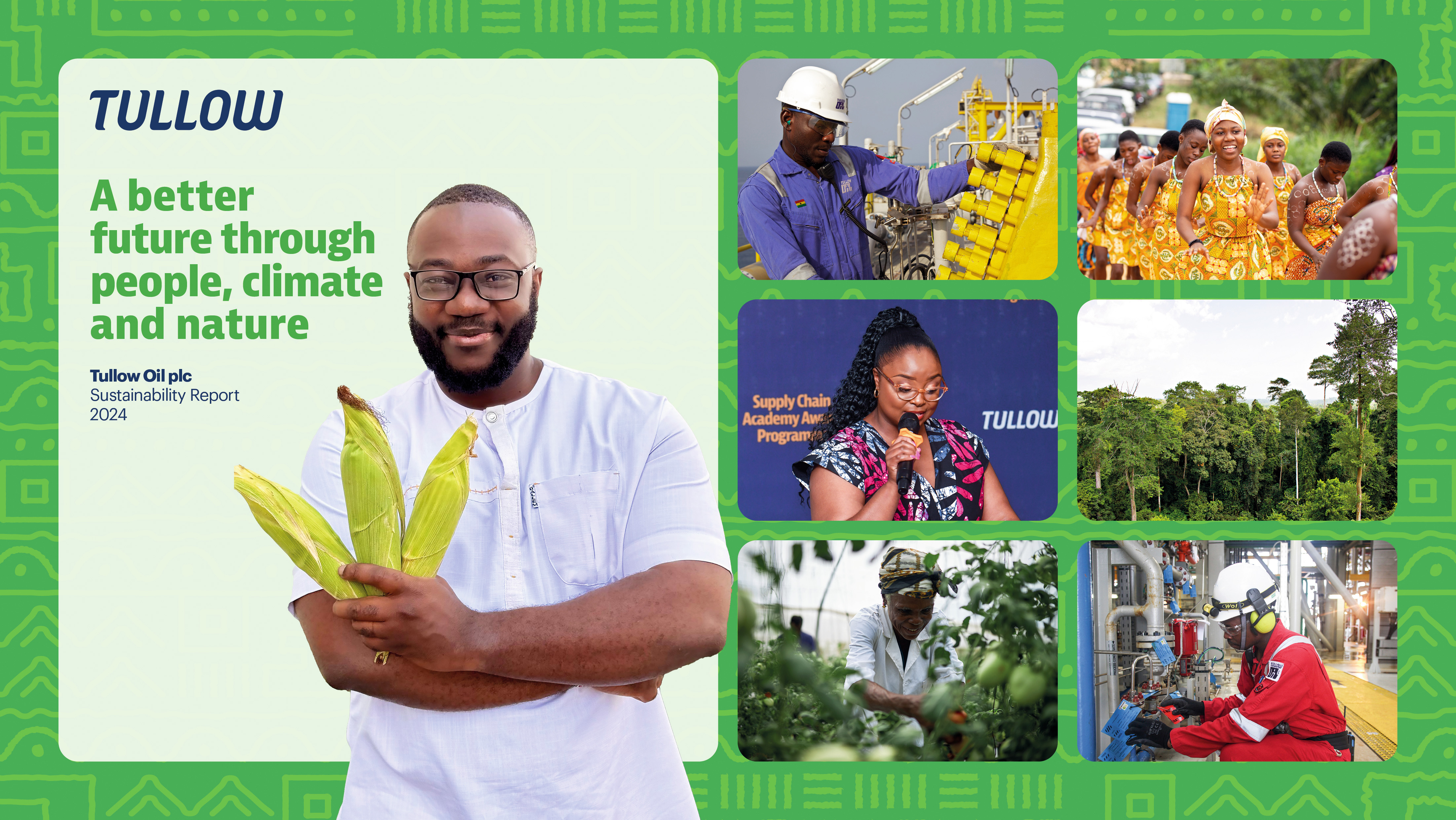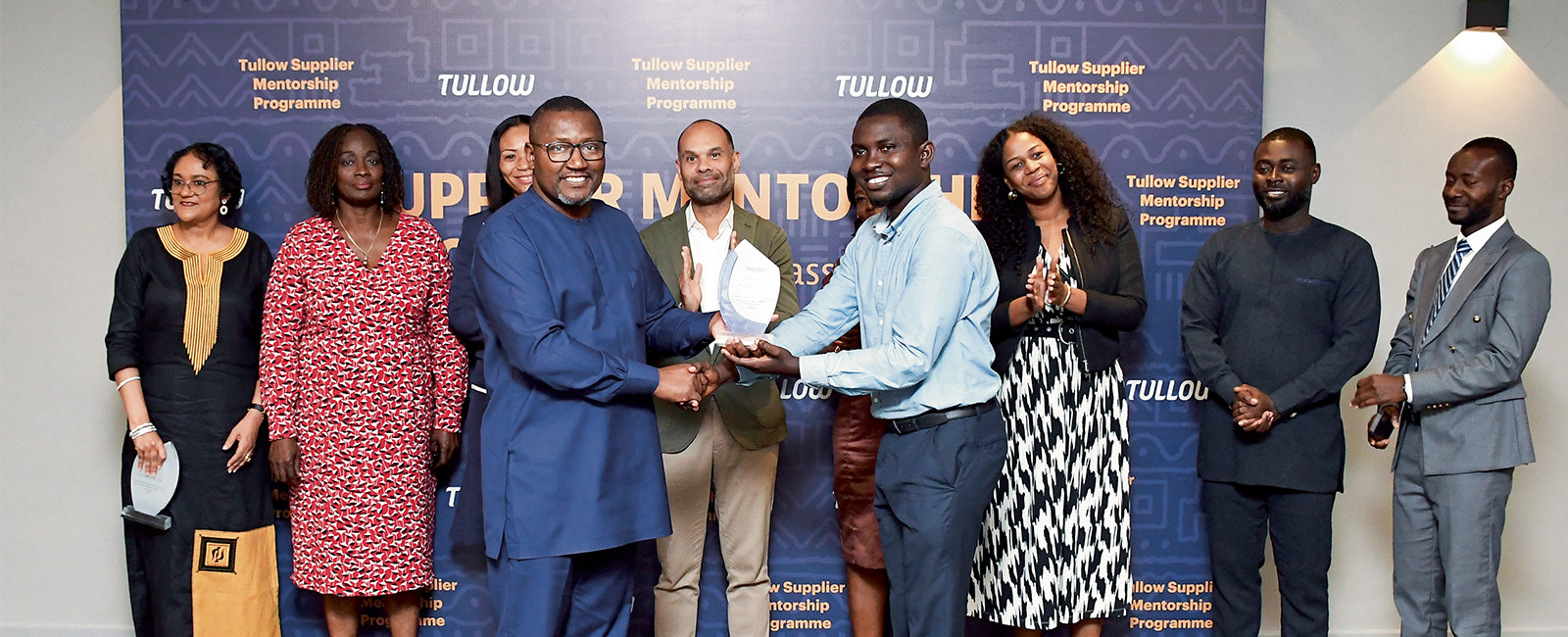Primary stakeholders of Tullow
Examples of our engagement in 2024 are shown below.
Colleagues
Primary means of engagement
- Safe working.
- Fair compensation and benefits.
- Values-based culture.
- Regular and timely business updates.
- Development opportunities.
Group-level engagement overview
- Town hall and team meetings.
- Leadership coffee mornings and brunches.
- Engagement surveys.
- Employee advisory forums (the Employee Engagement Forum and the Tullow Advisory Panel (TAP)).
Board-level engagement overview
- Quarterly meetings with the TAP.
- CEO and CFO town hall meetings with employees, including open Q&A sessions.
Outcomes
- The 2024 employee engagement survey had an average positive score of 70%.
- Positive employee feedback on Board engagement
Host governments and communities
Primary means of engagement
- Responsible operator of national assets.
- Revenues and taxes from operations.
- Socio-economic investment and support.
- Consultation on operational initiatives
Group-level engagement overview
- Proactive engagement with government officials.
- Regular interaction via our local Social Performance teams.
- Regular surveys, advocacy and industry collaborations.
Board-level engagement overview
- Chair and CEO meet with national government representatives.
- Regular Social Performance team Board updates.
Outcomes
- $731 million direct socio-economic contribution.
- Community programmes focused on education, skills development and entrepreneurship.
- Progressed our nature-based offset programme with the Ghana Forestry Commission.
Investors and lenders
Primary means of engagement
- Strategy and delivery.
- Sustainable returns.
- Regular communication and transparency.
- Strong ESG performance, particularly management of climate change impacts.
Group-level engagement overview
- Investor relations (IR) programme including regular updates and roadshows.
- Frequent group and one-on-one meetings.
- Participation in industry conferences.
Board-level engagement overview
- Annual General Meeting.
- Chair and Senior Independent Director meet with shareholders as required.
- Regular Board updates on IR programme, including investor feedback.
Outcomes
- Continued positive engagement with and support from shareholder base.
- Extension of revolving credit facility demonstrating continued strong bank support.
- Progress on our Net Zero strategy.
Suppliers
Primary means of engagement
- Long-term relationships.
- Safe working.
- Fair terms.
- Local content investment.
Group-level engagement overview
- Regular commercial dialogue.
- Quarterly key supplier performance reviews.
- Supplier training events in relation to our business requirements.
Board-level engagement overview
- Chair, CEO and CFO meet with supplier counterparts to assess performance and build relationships.
Outcomes
- Ethical procurement.
- Responsible business practices.
- Motivated suppliers performing to high standards.
- Cost-effective and efficient procurement.
ESG experts, non-governmental organisations and industry peers
Primary means of engagement
- Safe and sustainable operations.
- Input into industry debates and consultations.
- Proactive engagement in relation to issues.
Group-level engagement overview
- Industry trade association corporate memberships including the Extractive Industries Transparency Initiative.
- Participation in ESG-focused and other industry events and conferences.
- Participation in technical peer-to-peer events.
Board-level engagement overview
- Board oversees sustainability strategy.
- Regular Board updates on relevant ESG developments.
Outcomes
- Updated sustainability approach.
- Increased human rights awareness.
- Developed nature roadmap and ambition.
- Published disclosures in line with TNFD framework.
SDG contribution
Tullow supports the world’s sustainable development priorities to deliver global prosperity by 2030 as set out in the United Nations Sustainable Development Goals (SDGs).
Our sustainability approach aligns with the SDGs, with our key contributions directly advancing 11 SDGs. A summary of the ways we do this is shown below.
Care for people
- We provide a safe working environment for employees, contractors and visitors, including a strong emphasis on process safety and asset integrity.
- We invest in supporting, educating and developing our employees in an empowering and inclusive working culture. Our localisation strategy promotes employment and advancement of African nationals.
- We promote health and wellness for our employees.
- We proactively uphold and respect human rights and progress actions to address identified salient issues.
- We proactively manage our impacts in our host countries through local engagement and community support.
- We contribute to socio-economic development in our host nations by developing transferrable skills, connecting people to jobs and supporting new business development.
- We help to build the capacity of local businesses through extensive training and engagement with local suppliers.
Achieve Net Zero
- We advance responsible and efficient energy production in our host countries.
- We are decarbonising our assets and have committed to achieving Net Zero Scope 1 and 2 GHG net equity emissions by 2030.
- We have commenced a nature-based carbon offset initiative in Ghana with an investment of more than $90 million over 10 years to generate at least 600,000 tonnes per year in carbon offsets.
Respect the environment
- We strive to avoid negative impacts on biodiversity during all phases of our activities.
- We have adopted a No Net Loss ambition by 2030, supporting the Kunming-Montreal Global Biodiversity Framework, committing us to assuring that any loss occurring in our operations is minimised, restored and balanced by ecologically equivalent gains onsite or offsite.
- We practise responsible decommissioning, so that, as we exit assets in our host countries, we aim to leave oil field sites with no negative impacts on biodiversity or the environment in general.
- We conserve water and minimise waste throughout our operations.
- In Ghana, we undertake marine mammal and tetrapod observation by trained observers to watch and record marine mammal sightings within the Jubilee and TEN fields as part of our overall protocol to avoid harm to marine mammals and turtles.
Our Sustainability Report 2024
This Sustainability Report complements our 2024 Annual Report and provides further details of our environmental and social performance over the past year.

